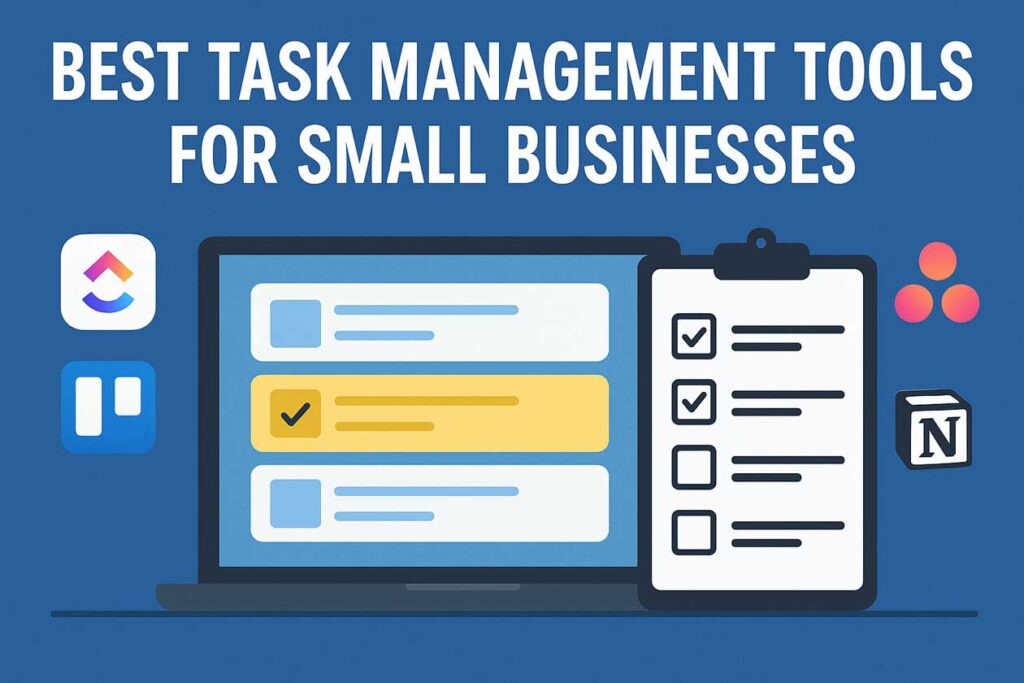
Running a small business comes with endless responsibilities—meeting deadlines, managing client expectations, collaborating with teams, and staying organized across multiple projects. Without the right systems, tasks can quickly slip through the cracks, leading to stress, missed opportunities, and wasted time.
That’s where task management tools come in. These platforms help small businesses streamline workflows, assign responsibilities, track progress, and maintain accountability. The good news? There are plenty of affordable, easy-to-use options designed specifically with small teams in mind.
In this article, we’ll explore the best task management tools for small businesses in 2025, what makes them stand out, and how to choose the right one for your needs.
Why Small Businesses Need Task Management Tools
Unlike large corporations with specialized departments, small businesses often operate with lean teams wearing multiple hats. A single person may juggle sales, marketing, operations, and customer service. Without proper task management, this juggling act leads to burnout and inefficiency.
The right task management tool helps by:
- Centralizing tasks – no more scattered notes, sticky reminders, or endless email chains.
- Improving collaboration – team members know who is responsible for what and when.
- Boosting accountability – progress tracking keeps everyone on the same page.
- Saving time – automation eliminates repetitive administrative tasks.
- Supporting growth – scalable systems adapt as your business expands.
Now, let’s look at the best tools available today.
1. ClickUp – Best All-in-One Solution
ClickUp has rapidly become one of the most popular task management tools for small businesses—and for good reason.
It offers everything from to-do lists, Kanban boards, calendars, and Gantt charts to built-in chat, docs, time tracking, and automation. Essentially, it replaces the need for multiple apps, giving teams a single workspace for everything.
Why it’s great for small businesses:
- Highly customizable—adapt workflows to your industry.
- Affordable plans, with a generous free tier.
- Central hub for communication, documentation, and reporting.
ClickUp is especially useful for businesses that want an all-in-one platform that can grow with them.
2. Asana – Best for Structured Project Tracking
Asana has long been a favorite among startups and small businesses thanks to its intuitive layout and powerful features. It allows teams to organize projects using lists, boards, and timelines, while automation rules help streamline repetitive processes.
Why it’s great for small businesses:
- Free plan for up to 10 users.
- Clean, easy-to-navigate interface.
- Multiple views—task list, calendar, Kanban, and Gantt.
- Strong integrations with tools like Slack, Google Drive, and Microsoft Teams.
Asana is particularly effective for growing teams that need structured workflows and reliable tracking.
3. Trello – Best for Visual Simplicity
For businesses that prefer simplicity, Trello is a fantastic option. Its Kanban-style boards make task management visual and easy to understand at a glance.
Each project is represented by a board, tasks are cards, and progress is tracked by moving cards across columns such as “To Do,” “In Progress,” and “Done.”
Why it’s great for small businesses:
- Extremely beginner-friendly.
- Free plan covers most needs for small teams.
- Integrates with apps like Slack, Dropbox, and Google Drive.
- Ideal for creative teams, freelancers, and startups.
If your business wants a lightweight and visual tool that’s easy to adopt, Trello is a winner.
4. Monday.com – Best for Customizable Dashboards
Monday.com is another highly popular task management platform, known for its colorful, customizable dashboards. It offers multiple views (calendar, Kanban, Gantt, and timeline) and supports advanced automations.
Why it’s great for small businesses:
- Tailor workflows to match your team’s unique needs.
- Great for businesses in specialized industries (marketing, construction, sales).
- Visual reporting for better decision-making.
Monday.com is ideal for businesses that want flexibility and advanced tracking tools without sacrificing user-friendliness.
5. Notion – Best for Documentation and Tasks in One
Notion is a powerful all-in-one workspace that combines note-taking, databases, wikis, and task management. Small businesses love it because it doubles as both a knowledge hub and a project manager.
Why it’s great for small businesses:
- Combines tasks and documentation in one place.
- Flexible database system for custom tracking.
- Great for content-heavy businesses, agencies, or knowledge-based teams.
If your team handles a lot of documentation, research, or SOPs, Notion is a perfect solution.
6. Todoist – Best for Simple Task Lists
Sometimes, small businesses don’t need complex project management systems. Todoist is perfect for teams or individuals who just want a simple to-do list app with collaboration features.
Why it’s great for small businesses:
- Easy to set up and use.
- Offers task priorities, deadlines, and recurring reminders.
- Kanban view available for visual task management.
- Affordable and accessible across all devices.
Todoist works best for solopreneurs or very small teams managing straightforward task lists.
7. Basecamp – Best for Flat-Rate Team Collaboration
Basecamp has been around for years and remains a strong choice for small businesses. Unlike other platforms that charge per user, Basecamp offers flat-rate pricing—which is cost-effective as your team grows.
Why it’s great for small businesses:
- Combines messaging, file sharing, to-do lists, and scheduling.
- Simple, no-frills interface.
- Flat monthly pricing makes budgeting predictable.
Basecamp is ideal for teams that want simplicity, affordability, and collaboration tools in one place.
8. Microsoft Planner – Best for Microsoft 365 Users
If your small business already uses Microsoft 365, Microsoft Planner integrates seamlessly with Teams, Outlook, and OneDrive. It offers boards, task assignments, file sharing, and reporting.
Why it’s great for small businesses:
- Included in Microsoft 365 subscriptions.
- Easy integration with Microsoft apps.
- Simple and effective task management.
As of 2025, Microsoft Planner has merged with Project, giving users even more powerful planning capabilities.
9. Smartsheet – Best for Spreadsheet Lovers
Smartsheet is essentially Excel on steroids—a spreadsheet-style tool designed for project and task management. It includes automation, file sharing, Gantt charts, and reporting features.
Why it’s great for small businesses:
- Familiar spreadsheet interface for easy adoption.
- Great for teams already comfortable with Excel.
- Scalable with powerful reporting and integrations.
This is the right tool for businesses that want task management in a spreadsheet format.
How to Choose the Right Tool
With so many options, here are some quick tips for selecting the best fit:
- Evaluate team size and complexity – Do you need a simple to-do list or a full-scale project manager?
- Check integration needs – Ensure the tool connects with apps you already use.
- Start small – Use free versions or trials before committing to a paid plan.
- Balance simplicity with power – Too many features can overwhelm small teams.
- Plan for growth – Choose a tool that scales as your business expands.
Final Thoughts
Task management tools are no longer a luxury—they’re a necessity for small businesses striving to stay competitive and organized. Whether you need the all-in-one power of ClickUp, the visual simplicity of Trello, the structured reliability of Asana, or the documentation-friendly Notion, there’s a solution to fit every workflow and budget.
The best advice? Test a few tools before committing. What matters most is choosing a system your team will actually use consistently. Once in place, the right tool can transform the way your small business operates, helping you save time, boost productivity, and scale with confidence.



